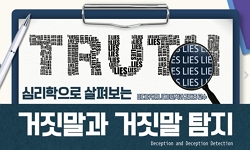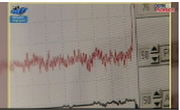This study aims to examine the effects of objective self-awareness on the psychological characteristics of suspects when they tell a lie. To manipulate objective self-awareness, half the suspects were seated in front of a mirror and half were not duri...
http://chineseinput.net/에서 pinyin(병음)방식으로 중국어를 변환할 수 있습니다.
변환된 중국어를 복사하여 사용하시면 됩니다.
- 中文 을 입력하시려면 zhongwen을 입력하시고 space를누르시면됩니다.
- 北京 을 입력하시려면 beijing을 입력하시고 space를 누르시면 됩니다.

거짓말 탐지 상황에서 객관적 자기인식이 용의자의 심리상태에 미치는 영향 = The effects of objective self-awareness on lying suspects’ psychological characteristics
한글로보기부가정보
다국어 초록 (Multilingual Abstract)
This study aims to examine the effects of objective self-awareness on the psychological characteristics of suspects when they tell a lie. To manipulate objective self-awareness, half the suspects were seated in front of a mirror and half were not during a polygraph test. After the polygraph test, the suspects were instructed to complete a psychological characteristics questionnaire focusing on such characteristics as shame/guilt, state anxiety, and impression management. Additionally, we divided the suspects into two groups depending on their polygraph test results to identify the differences in psychological characteristics between the lie and truth groups. The lie group showed significantly higher guilt than did the truth group; however, the two groups were not statistically significantly different in terms of their reporting of shame. In addition, there were differences in anxiety and impression management, depending on objective self-awareness. The lie group who completed the polygraph in front of a mirror were higher in anxiety and expressed more impression management than did those who were not in front of a mirror. In contrast, the truth group was unaffected by the presence of the mirror. These results showed there were differences in the psychological characteristics of the suspects in the two groups depending on objective self-awareness. These findings may help to correctly detect truth and lies in many applied settings, such as the forensic, judicial, and investigative domains.
국문 초록 (Abstract)
본 연구의 목적은 거짓말 탐지 상황에서 객관적 자기인식이 용의자들의 심리상태에 미치는 영향에 대해서 확인하기 위함이다. 이를 위해서 실제 범죄사건의 용의자를 대상으로 객관적 자기...
본 연구의 목적은 거짓말 탐지 상황에서 객관적 자기인식이 용의자들의 심리상태에 미치는 영향에 대해서 확인하기 위함이다. 이를 위해서 실제 범죄사건의 용의자를 대상으로 객관적 자기인식을 조작(거울유무)하여 죄책감/수치심, 상태불안, 사회적 바람직성을 측정하였으며, 용의자 집단 중 폴리그래프 검사 결과를 근거로 진실집단과 거짓집단으로 나누어 객관적 자기인식에 따른 집단 간 심리상태를 비교하였다. 분석결과, 죄책감은 거짓집단이 진실집단보다 더 높게 나타났으나, 수치심은 집단 간 차이가 나타나지 않았다. 그에 반해 상태불안과 사회적 바람직성에서는 객관적 자기인식에 따라 진실집단과 거짓집단 간 차이가 나타났다. 구체적으로 진실집단은 객관적 자기인식에 따라 상태불안과 사회적 바람직성에서 차이가 나타나지 않았으나, 거짓집단은 거울이 있는 조건이 거울이 없는 조건에 비해 상태불안과 사회적 바람직성이 유의미하게 높은 것으로 나타났다. 즉 객관적 자기인식이 높을 경우 거짓말 하는 사람은 불안을 더 느끼며 상대방에게 보다 좋은 인상을 주기 위해 긍정적 인상관리 전략을 활용한다는 것을 확인하였다. 이러한 연구결과는 향후 정확한 거짓말 탐지를 필요로 하는 경찰, 검찰 등 수사기관에 유용한 정보를 제공할 것으로 판단된다.
참고문헌 (Reference)
1 김석찬, "폴리그래프 검사 요인에 따른 검찰 처분 및 판결 일치도 연구: 검찰청 폴리그래프 실증 연구" 한국법심리학회 6 (6): 13-31, 2015
2 송수민, "수치심경향성과 죄책감경향성의 심리적 특성 비교" 한국상담심리학회 20 (20): 125-144, 2008
3 심종온, "수치심 경향성, 죄책감 경향성 및 사건귀인이 우울에 미치는 영향" 가톨릭대학교 대학원 1999
4 정보라, "사회적 바람직성의 구인 탐색" 이화여자대학교 대학원 2005
5 박판규, "거짓말탐지검사" 삼우사 2003
6 김고은, "거짓말 탐지상황에서 나타나는 용의자의 심리특성 연구" 한국사회및성격심리학회 27 (27): 75-86, 2013
7 金正澤, "特性 不安과 社會性과의 關係" 고려대학교 대학원 1978
8 Harder, D. H., "Two promising shame and guilt scales : A construct validity comparison" 55 : 729-745, 1990
9 Aquino, K., "The self-importance of moral identity" 83 : 1423-1440, 2002
10 Horvath, F. S., "The reliability of polygraph examiner diagnosis of truth and deception" 62 : 276-281, 1971
1 김석찬, "폴리그래프 검사 요인에 따른 검찰 처분 및 판결 일치도 연구: 검찰청 폴리그래프 실증 연구" 한국법심리학회 6 (6): 13-31, 2015
2 송수민, "수치심경향성과 죄책감경향성의 심리적 특성 비교" 한국상담심리학회 20 (20): 125-144, 2008
3 심종온, "수치심 경향성, 죄책감 경향성 및 사건귀인이 우울에 미치는 영향" 가톨릭대학교 대학원 1999
4 정보라, "사회적 바람직성의 구인 탐색" 이화여자대학교 대학원 2005
5 박판규, "거짓말탐지검사" 삼우사 2003
6 김고은, "거짓말 탐지상황에서 나타나는 용의자의 심리특성 연구" 한국사회및성격심리학회 27 (27): 75-86, 2013
7 金正澤, "特性 不安과 社會性과의 關係" 고려대학교 대학원 1978
8 Harder, D. H., "Two promising shame and guilt scales : A construct validity comparison" 55 : 729-745, 1990
9 Aquino, K., "The self-importance of moral identity" 83 : 1423-1440, 2002
10 Horvath, F. S., "The reliability of polygraph examiner diagnosis of truth and deception" 62 : 276-281, 1971
11 Bull, R., "The polygraph test: Lies, truth and science" 10-19, 1988
12 Lawson, G., "The effects of self-awareness on body movement indicators of the intention to deceive" 44 : 687-693, 2013
13 Buckley, J. P., "The Influence of Race and Gender on Blind Polygraph Charts Analyses" 20 (20): 247-258, 1991
14 Ekman, P., "Telling lies: clues to deceit in the marketplace, politics and marriage" Norton and Company 2001
15 Argyle, M., "Social Interaction" Artherton 1969
16 Lewis, M., "Shame: the exposed self" The Free Press 1992
17 Duval, S., "Self-focus, felt responsibility and helping behavior" 37 : 1769-1778, 1979
18 Phillips, A. G., "Self-Awareness and the Emotional Consequences of Self-Discrepancies" 5 : 703-713, 2005
19 Granhag, P. A., "Repeated Interrogations : Verbal and non-verbal cues to deception" 16 : 243-257, 2002
20 Rogers, C., "Psychology: A study of a science, vol. 3: Formulations of the person and the social context" McGraw Hill 1959
21 Beaman, A. L., "Objective self-awareness and transgression in children : A field study" 37 : 1835-1846, 1979
22 Ickes, W., "Objective self-awareness and self-esteem" 9 : 202-219, 1973
23 Gougler, M., "Meta-analytic survey of criterion accuracy of validated polygraph techniques" 40 : 194-305, 2011
24 Paulhus, D. L., "Manual for the Balanced Inventory of Desirable Responding(BIDR-7)" Multi-Health systems 1998
25 Buller, D. B., "Interpersonal deception : VII. Behavioral profilers of falsification, equivocation, and concealment" 13 : 366-395, 1994
26 Adler, A., "Individual psychology" Clark University Press 1930
27 Mueller-Hanson, R. A., "Individual differences in impression management : An exploration of the psychological process underlying faking" 48 : 288-312, 2006
28 Hartwig, M., "Impression and information management : On the strategic self-regulation of innocent and guilty suspects" 3 : 10-16, 2010
29 Kircher, J. C., "Human versus computerized evaluations of polygraph data in laboratory setting" 73 : 291-302, 1988
30 Spielberger, C. D., "Handbook of modern personality theory" Wiley 1977
31 Carver, C. S., "Facilitation of physical aggression on through objective self-awareness" 10 : 365-370, 1974
32 Ekman, P., "Face, voice, and body in detecting deceit" 15 : 125-135, 1991
33 DePaulo, B. M., "Everyday Lies in Close and Casual Relationships" 74 : 63-79, 1998
34 Diener, E., "Effects of self-awareness on antinormative behavior" 10 : 107-111, 1976
35 Vrij, A., "Detecting deceit via analysis of verbal and nonverbal behavior" 24 : 239-263, 2000
36 DePaulo, B. M., "Cues to Deception" 129 : 74-118, 2003
37 Inbau, F. E., "Criminal interrogations and confessions" Aspen 2001
38 Ben-Shakhar, G., "Clinical judgment and decision-making in CQT-polygraphy" 26 : 232-240, 1991
39 Eisenberg, N., "Altruistic cognition, emotion, and Behavior" Erlbaum 1986
40 Harder, D. W., "Advances in personality assessment" Erlbaum 1987
41 Zuckerman, M., "Advances in Experimental Social Psychology, Vol.14" Academic Press 1-59, 1981
42 Duval, S., "A theory of objective self-awareness" Academic Press 1972
43 Matte, J. A., "A study of the relative effectiveness of physiological data in field polygraph examinations" 21 (21): 1-22, 1991
동일학술지(권/호) 다른 논문
-
외로움과 돈에 대한 왜곡된 믿음 - 행복추구 수단으로써의 돈을 중심으로
- 한국사회및성격심리학회
- 김가영
- 2016
- KCI우수등재
-
- 한국사회및성격심리학회
- 정규희
- 2016
- KCI우수등재
-
북한이탈주민이 다문화집단에 대해 느끼는 현실갈등인식이 삶의 만족에 미치는 영향: 지각된 차별감의 매개효과를 중심으로
- 한국사회및성격심리학회
- 양계민
- 2016
- KCI우수등재
-
인지신경심리학적 도구를 통한 암묵적 자살위험성 평가: 수사 과정에서의 적용 가능성
- 한국사회및성격심리학회
- 차아름
- 2016
- KCI우수등재
분석정보
인용정보 인용지수 설명보기
학술지 이력
| 연월일 | 이력구분 | 이력상세 | 등재구분 |
|---|---|---|---|
| 2020 | 평가예정 | 계속평가 신청대상 (등재유지) | |
| 2015-01-01 | 평가 | 우수등재학술지 선정 (계속평가) | |
| 2011-01-01 | 평가 | 등재학술지 유지 (등재유지) |  |
| 2009-01-01 | 평가 | 등재학술지 유지 (등재유지) |  |
| 2007-01-01 | 평가 | 등재학술지 유지 (등재유지) |  |
| 2005-01-01 | 평가 | 등재학술지 유지 (등재유지) |  |
| 2002-01-01 | 평가 | 등재학술지 선정 (등재후보2차) |  |
| 2000-01-01 | 평가 | 등재후보학술지 선정 (신규평가) |  |
학술지 인용정보
| 기준연도 | WOS-KCI 통합IF(2년) | KCIF(2년) | KCIF(3년) |
|---|---|---|---|
| 2016 | 1.16 | 1.16 | 0.95 |
| KCIF(4년) | KCIF(5년) | 중심성지수(3년) | 즉시성지수 |
| 0.96 | 1.58 | 1.54 | 0.4 |




 KCI
KCI







